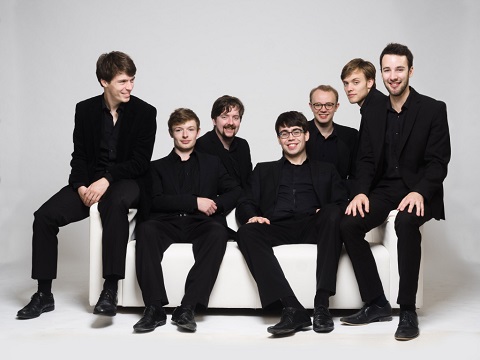The programme that they presented was very similar, though longer, to that
performed at Temple Church during
last year’s Winter Festival
, but with the items in a re-arranged order and with additional items
interspersed, new relationships between musical works were articulated.
The singers made the most of the architectural space. A lone voice floated
purely from the gallery at the start of Veni, veni Emmanuel,
inviting first alto and tenor to join him in, then welcoming the full
ensemble into the rejoicing: ‘Gaude, Gaude, Emmanuel.’ The supple
polyphonic windings and the deftly negotiated harmonic progressions that
followed had a smooth assurance which characterised the whole performance,
and the tapered unison of the close was compelling. They moved segue into
the plainchant Rorate Caeli, during which the ensemble processed
through the nave; and then, moved on without pause, the vigorous and robust
counterpoint of Michael Praetorius’ Nun Komm, der Heiden Heiland
seeming to spring free from the poised chant.
The programme incorporated several traditional carols. Gaudete
(arranged by Brian Kay), which had opened the lunchtime concert in Temple
Church, here accompanied the procession through the nave which marked the
recommencement after the interval. Park joined five of his ensemble for
Praetorius’ arrangement of Es ist ein Ros Entsprungen, and here
there was a lovely lyrical breadth. A deepening of the texture in the
central verse was balanced by the freshness of the final verse, which
depicts the new-born Christ as a ‘Flower whose fragrance tender with
sweetness fills the air’, where James Guy’s countertenor melody floated
above the ensemble hum with unaffected simplicity and sweetness, the
phrasing beautifully eloquent.
There is no rose
reduced the ensemble to three - alto, tenor, bass; somehow the trio sound
seemed simultaneously lean and sumptuous, the pure clarity of Alexander
Chance’s upper line placed against the freely moving lower voices. Coventry Carol followed segue, from the gallery, the tenor line
imbuing vigour into the central verse which tells of Herod raging and
slaying of the children, before another processed chant,Laetentur caeli brought the singers back together. In dulci jubilo as arranged by Bach allied a gentle lilt with a
strong sense of spiritual purpose and musical direction.
Alongside the old we had the new. The concordance of dynamic, tone and
rhythm at the pianissimo opening of Jonathan Harvey’s The Annunciation was impressive and this carol had a delicate
preciousness, the sliding harmonies - perfectly tuned - suggesting the
‘strangest strangeness’ of the divine visitation and the homophonic
melodiousness of the close conveying the rapture of the communion between
angel and girl. Cheryl Frances-Hoad’s The Promised Light of Life
was similarly tender of timbre, but more comforting in spirit, the ensemble
voices swelling and receding with organic oneness; similar fluidity
characterised Arvo Pärt’s Morning Star, the ebbs and flows of
voices bringing to mind the softly pulsing star in the night sky, promising
‘everlasting day’.
I was impressed by the recent release, by Hyperion, of a collection of
Park’s choral music
and so it was good to have an opportunity to hear again Park’s own On the Infancy of our Saviour. The harmonic roving matched the
initial questioning anxiety of Francis Quarles’ text which reflects on the
child’s grace with bewildered hindsight of the betrayal to come, while the
strong consonance of the closing episode seemed to swell from deep within
the ensemble, blooming with the expressed certainty of faith. Such
certainty is absent from Thomas Hardy’s poem ‘The Oxen’, but there is frail
hope, and this was conveyed by the flowing continuity of the counterpoint
in Jonathan Rathbone’s setting, particularly in the lower voices. Here,
too, we had a compellingly well-projected narration of the poetic text -
perhaps the slow tempo was advantageous in this regard, as elsewhere the
group’s diction was not always so clear.
Masterpieces of Renaissance polyphony completed the programme. I had some
misgivings last time I heard the Gesualdo Six perform Thomas
Tallis’s Videte Miraculum, and they were not entirely swept away
here. Again, the intonation was unsettled, the countertenor line seeming to
tug away from the centre, and as the counterpoint did not blend into a
seamless whole, so the unfolding episodes did not cohere convincingly. But,
the performance became increasingly persuasive as Park pushed towards the
close where the inner voices had compelling strength above the anchoring
bass.
William Byrd’s Vigilate was a vigorous call to attention
culminating in a florid final command, ‘omnibus dico: vigilate’ (I say to
all: Watch.). And, the Bohemian composer Jacob Handl provided an example of
late-Renaissance music from Europe, Canite tube (Blow the
trumpet), which buzzed with festive energy and uplifting verve. Then, to
Italy, for Andrea Gabrieli’s Hodie Christus natus est in which
Park joined his singers. The full ensemble exhibited wonderfully relaxed
and finely crafted phrasing as the voices worked in pairs and threes,
running through the scalic lines and pushing towards the jubilant
triple-time floridities of the ‘Alleluia’ close.
Claire Seymour
The Gesualdo Six: Owain Park (director), Guy James (countertenor), Alexander Chance
(countertenor), Tom Castle (tenor), Josh Cooter (tenor), Michael Craddock
(baritone), Sam Mitchell (bass).
Trad. arr. Lawson - Veni, veni, Emmanuel, Anon. (Plainchant) - Rorate Caeli, Praetorius - Nun Komm, der Heiden Heiland à
6, Harvey - The Annunciation, Trad. German harm. Praetorius - Es Ist ein’ Ros’ Entsprungen, Owain Park - On the Infancy of our Saviour, Tallis - Videte Miraculum,
Cheryl Frances-Hoad - The Promised Light of Life, Byrd -Vigilate, Trad. arr. Brian Kay - Gaudete, Arvo Pärt -Morning Star, Anon. - There is no rose, Trad. - Coventry Carol, Anon. (Plainchant) - Laetentur caeli, Handl - Canite tuba, Gabrieli - Hodie Christus natus est, Praetorius arr. Bach - In dulci jubilo, Jonathan Rathbone - The Oxen
St John’s Smith Square, London; Friday 14th December 2018.
